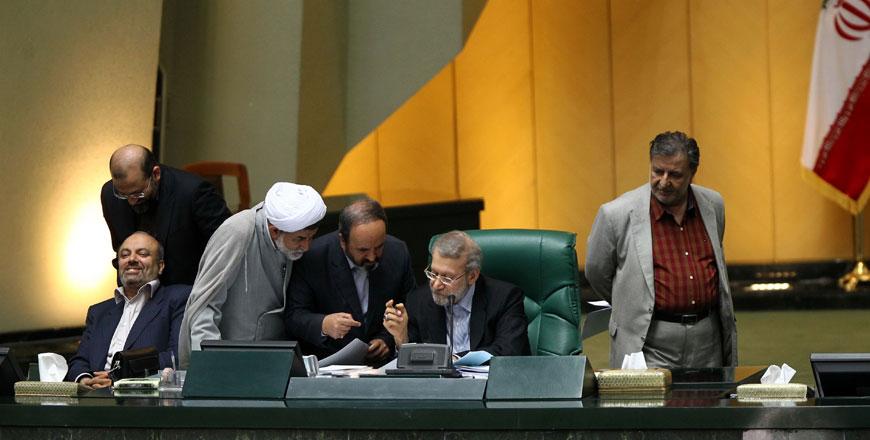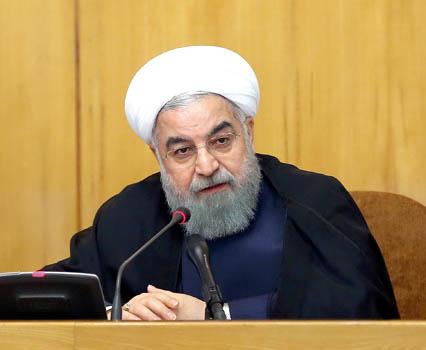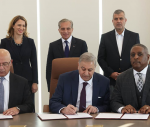You are here
Iran lawmakers curtailed on power to veto nuclear deal
By AFP - Jun 21,2015 - Last updated at Jun 21,2015

Iran Parliament Speaker Ali Larijani (2nd right) speaks with members of parliament during a session in Tehran on Sunday (AFP photo)
TEHRAN — Iran's parliament curtailed its own power to block a nuclear deal with world powers Sunday, effectively removing a longstanding threat that a final accord could be torn up by lawmakers.
A draft bill presented on Wednesday, which laid down strict criteria for Iran to accept any agreement, had threatened to complicate talks on a final accord, which are due to be finalised by June 30.
However, in a boost to President Hassan Rouhani's government, key amendments to the proposed legislation will now move the formal supervision of a deal out of the hands of lawmakers.
The original text had set criteria that parliament would have to say had been met for an agreement to be binding.
But the amended bill instead gives the right of supervision to the country's Supreme National Security Council (SNSC).
The council comprises ministers, military commanders and handpicked appointees of supreme leader Ayatollah Ali Khamenei.
Chaired by Rouhani, who is pushing hard for a nuclear deal, it is ultimately controlled by Khamenei, who will have the final word on any nuclear accord.
"Whatever decision the leader takes in this regard, we should obey in parliament," speaker Ali Larijani said after 199 MPs voted for the amendments in the 290-member chamber.
"We should not tie the hands of the leader," he added.
Only three lawmakers opposed the changes and five abstained, with six not voting and dozens more absent.
Although the sponsor of the original bill, Alaedin Boroujerdi, the chairman of parliament's national security and foreign policy committee, said it was designed to insulate Iran's negotiators from the West's "excessive demands", Larijani suggested otherwise.
"We want to help the country and not create new problems," he said, referring to the need to coordinate with the SNSC.
According to the official IRNA news agency Larijani earlier told Ahmad Tavakoli, a conservative MP critical of the bill being delayed: "We are not discussing the sale of potatoes, but an important issue for the country."
IRNA cited Rouhani as saying that "in the current situation, in order to advance the country and resolve its problems, we need to help each other more".
Roadblocks remain
Iran and the P5+1 powers (Britain, China, France, Russia and the United States plus Germany) agreed the outlines of the nuclear deal on April 2 after intensive talks went past a March 31 deadline.
Major roadblocks that remain include the West's ability to enforce tighter inspections of Iran's nuclear sites and other facilities.
Iranian officials insist there can be no inspections of military sites and the legislation published on Sunday forbids access beyond "conventional supervision" of nuclear sites.
French Foreign Minister Laurent Fabius, on a visit Sunday to the Palestinian territories and Israel, said any nuclear deal with Iran must be verifiable.
"We think that we must be extremely firm and that, if an agreement is to be reached, that agreement must be robust," he told journalists.
"That means that it must be able to be verified."
Any deal will still have to be ratified by Tehran's parliament but it would be highly unlikely by that stage that lawmakers would oppose a text approved by the SNSC.
The bill stipulates the need to lift all sanctions imposed on Iran as punishment for its nuclear programme, under which leading states have suspected the Islamic republic of developing a bomb.
However, the altered draft law is now more specific and says sanctions must be lifted "on the day Iran starts implementing its obligations", as opposed to "on the day of an agreement".
World powers insist that Iran's compliance must be verified if sanctions are to be removed, despite earlier insistence by Tehran that the measures, mostly economic, cease immediately.
In a sign of greater flexibility, Rouhani said on June 13 that "weeks or even months will pass" between signing and implementing the deal, which involves UN, EU and US sanctions being removed.
In a measure that mirrors that taken in Tehran, President Barack Obama has given US lawmakers 30 days to review a nuclear deal. Iran denies its nuclear programme has military objectives, insisting it is for purely peaceful energy development purposes capable of reducing its reliance on fossil fuels.
Related Articles
TEHRAN — Iran's parliament approved a controversial bill Tuesday that it said would protect the country's nuclear programme, but which could
Iran's president came under fire from MPs Tuesday for branding his critics as “political cowards” and urging them "go to hell" if they insist on opposing his policies.
TEHRAN — Iranian President Hassan Rouhani said on Wednesday that Tehran would "respond appropriately" to new US sanctions but that Iran rema














